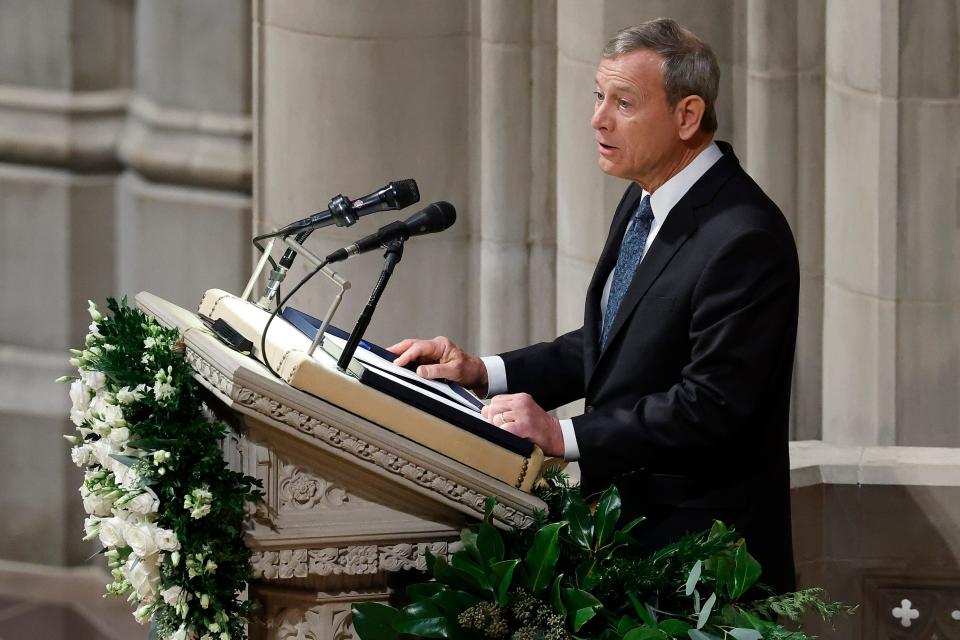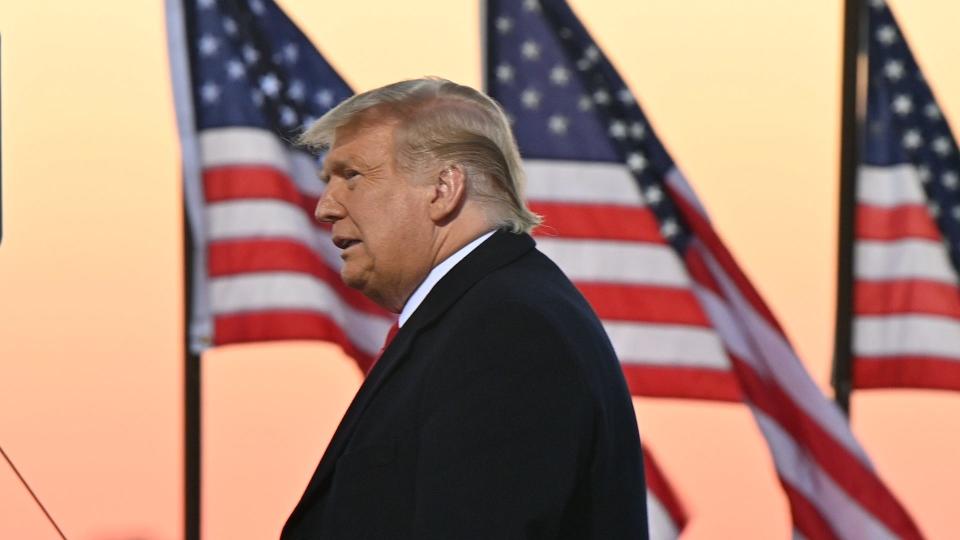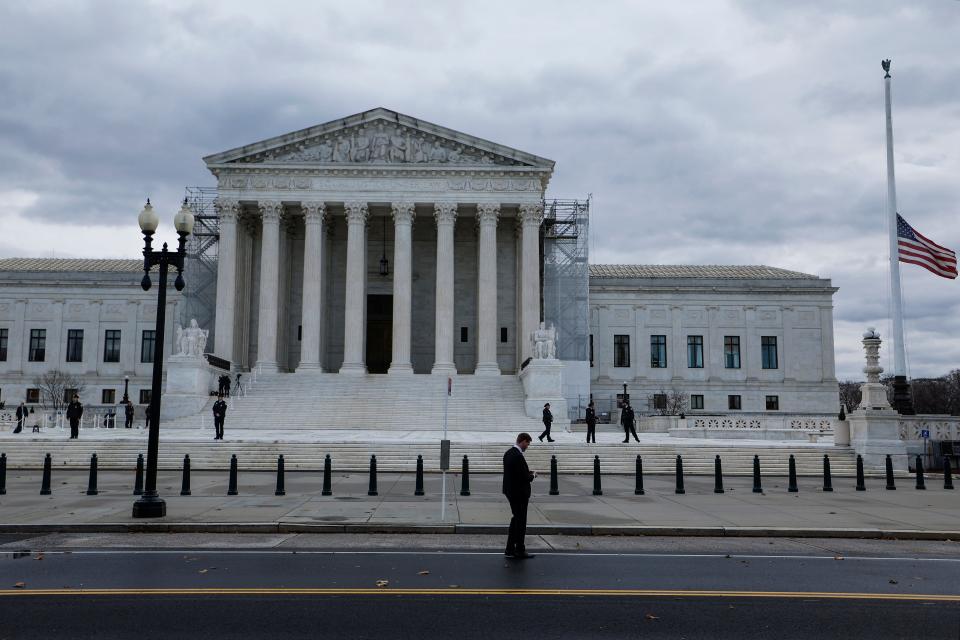Supreme Court may want to avoid Trump. Colorado's ballot ruling won't let them
- Oops!Something went wrong.Please try again later.
WASHINGTON − A stunning decision late Tuesday to disqualify former President Donald Trump from Colorado's 2024 primary ballot has thrust the U.S. Supreme Court once again into the place it least wants to be: the middle of a fraught legal fight with the potential to shake up next year's presidential election.
The nation's top court is already weighing whether to hear Trump's claim that he's entitled to immunity from federal charges tied to his interference in the 2020 election. The justices have also agreed to decide a suit questioning whether those accused in the Jan. 6, 2021, attack on the U.S. Capitol can face obstruction charges.
As significant as those cases are, the ruling from Colorado that Trump is ineligible to appear on the state's ballot because of his actions in connection with violence at the Capitol appeared certain to shove the U.S. Supreme Court into the 2024 election more explicitly than before. Trump aides said they would "swiftly" appeal the Colorado decision, potentially seeking emergency relief that would force the court to act within weeks.
"It exerts major pressure on the court," said Notre Dame Law School Professor Derek Muller. "Even inaction would functionally exclude (Trump) from not just Colorado but perhaps other states." Granting the case, Muller said, would require "the court to step into the thorniest of political thickets."
O'Connor: President Joe Biden remembers legacy of the late Sandra Day O'Connor
Though not unexpected, the cases involving Trump are queuing up at a moment when critics increasingly frame the court as a political institution − and the justices have occasionally appeared eager to shed that impression.
Polls show eroding support, particularly on the left, and a series of ethics scandals have only made matters worse.
The convergence of Trump-related litigation is likely to raise comparisons to the court's role in the 2000 election, when an almost entirely different bench decided in Bush v. Gore to stop the recounting of ballots in Florida. Effectively, that decision handed the presidency to George W. Bush. The late Justice Sandra Day O'Connor, who was remembered this week with a funeral service in Washington, questioned later in life the court's decision to get involved.
"Maybe the court should have said, 'We're not going to take it, goodbye,'" O'Connor told the Chicago Tribune editorial board in 2013. The case, she said, "stirred up the public" and "gave the court a less-than-perfect reputation."

What's at stake in the Colorado ballot case?
Colorado's Supreme Court ruled Trump could not appear on the state's presidential primary ballot because he had disqualified himself under the Constitution's insurrection clause for his actions on Jan. 6. Dozens of similar lawsuits have been filed, but the Colorado court was the first to rule against Trump.
For practical purposes, and likely sensing the inevitable appeal to the Supreme Court, the Colorado justices stayed their decision until early January at the earliest. More likely, the decision will be held until the Supreme Court rules.
Bradley Moss, an attorney who specializes in national security issues, predicted that the Supreme Court would do its best to decide the matter in a very limited way − likely on procedural issues.
"I have no reason to suspect the court is going to reverse on the substance,” he said.
Ty Cobb, a former White House attorney for Trump who has been critical of him in recent months, predicted the Supreme Court would reverse Colorado − one way or the other. The argument that the insurrection clause applies to Trump, he said, "doesn't hold up" because, he said, it doesn't appear to apply to presidents.
"The law," Cobb said, "seems to be clear" that the framers didn't intended to apply the insurrection clause to presidents and vice presidents but rather only to other "officers" of the government.
The timing may depend on the type of appeal Trump files, but the court will have to move quickly one way or the other. The Colorado primary is set for March 5.
Trump has dismissed the legal cases, including the Colorado ballot suit, as politically motivated.

What about immunity for Trump?
As the Colorado appeal works its way to the Supreme Court, another issue is already bubbling on the court's front burner.
Special counsel Jack Smith wants the justices to step into the ongoing legal battle about whether Trump can claim immunity from criminal charges tied to his alleged interference in the 2020 election. Smith is essentially asking the Supreme Court to leapfrog an appeals court that is already considering the question.
Trump, who is fighting that appeal, must file his response on Wednesday afternoon.
At the heart of Smith's request to the Supreme Court is a concern about timing: He wants to ensure a lower court can hold to an early March trial start that had been set in the high-profile case. If prosecutors have to wait for federal courts to resolve the immunity question through the normal process, it could take months.
Jan. 6 lands on the docket
Earlier this month, the top court agreed to hear an appeal from a maninvolved in Jan. 6 who claims prosecutors overstepped by charging him with an Enron-era obstruction crime meant to deal with financial shenanigans.
The case is being closely watched in part because more than 200 people have been charged with violating the law at issue − a prohibition on obstructing "official proceedings" − including Trump himself. If prosecutors could secure convictions for the felonies, they could try to tack on 20 years to prison sentences.
Joseph Fischer appealed one count of his indictment tied to his involvement in the attack. He claims that the crime − enacted by Congress in 2002 in response to the Enron financial meltdown − was intended to punish people for tampering with evidence and not people who participated in a riot.

Fischer described the provision as an "anti-shredding" law in a court document.
But the Justice Department argued the counting of electoral votes − interrupted as lawmakers fled for their safety and police battled with rioters − qualified as an “official proceeding.” The law, prosecutors say, would cover someone lying to a grand jury or “burning a building to conceal the bodies” of murder victims.
“It also includes storming the Capitol to derail a congressional proceeding,” the department said last year.
This article originally appeared on USA TODAY: Colorado ballot ruling on Trump throws Supreme Court into 2024 mix

